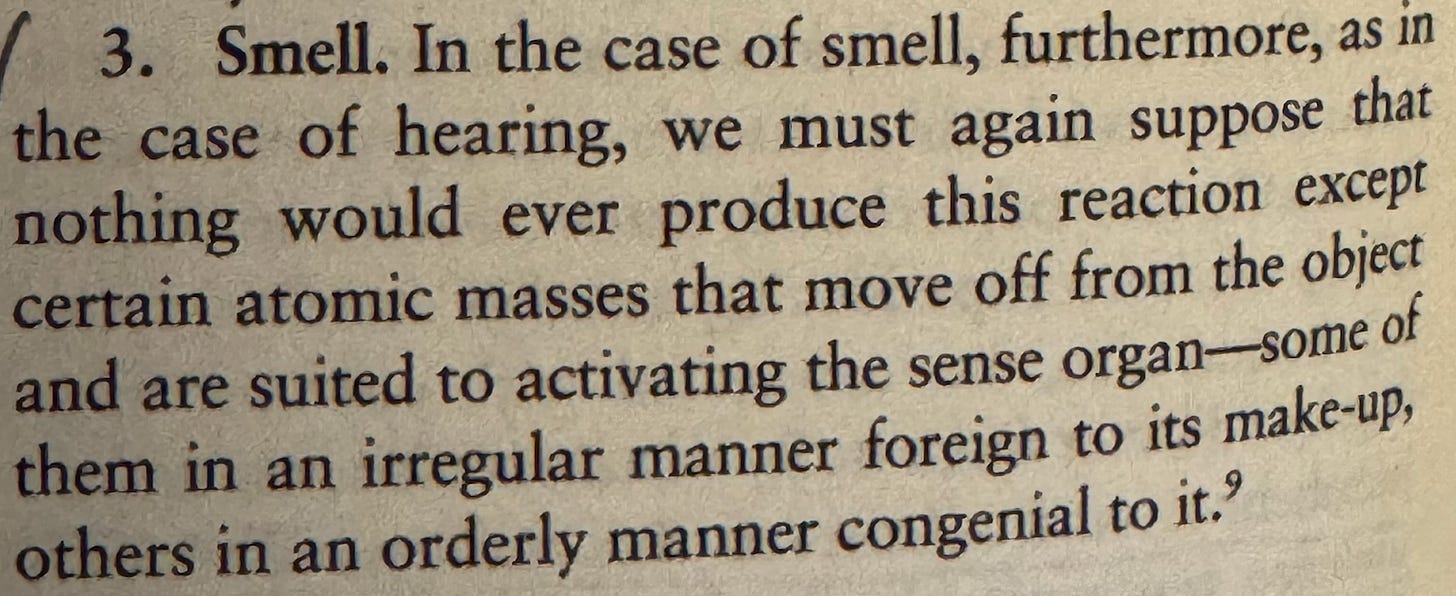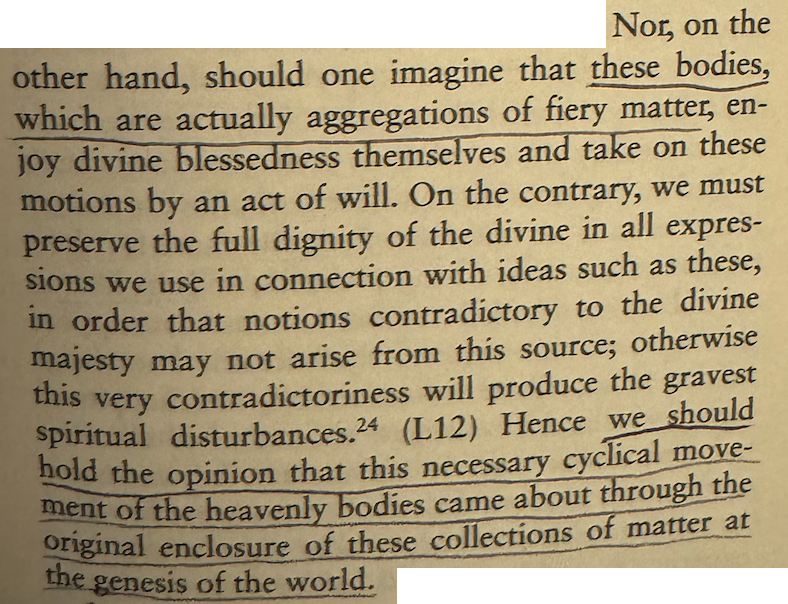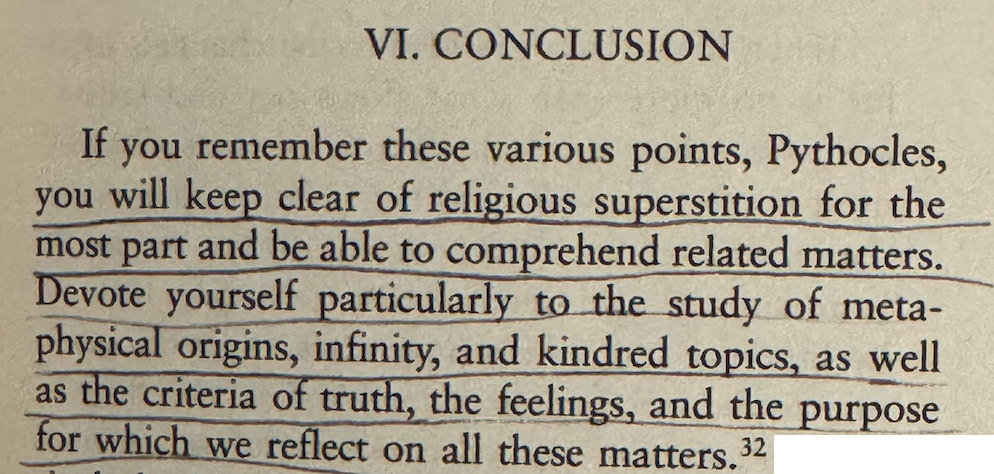Epicurus, the First "Rationalist"?
AI is decoding ancient scrolls from Epicureans -- what's that philosophy about?
Note: This is a “for fun” philosophy/history post. For a deep dive or more AI IQ tests, stay tuned
Exciting news came out last month, as researchers used AI to read a bit of an ancient scroll that was fried by the eruption of Mt. Vesuvius, which destroyed the Roman town of Pompeii about 2,000 years ago.
What’s in the scrolls?
The lava-fried scrolls were found in a library in a fancy villa owned by Julius Caesar’s wife’s father. Epicurean philosopher Philodemus may have been a “scholar in residence” who worked in that library. The surviving scrolls now look like this:
Using high-tech CT scans of the scrolls, researchers were able to detect fragments of ink inside them. The new breakthrough is that they used AI to identify the locations of the ink on each page, without unwrapping the scrolls. The result:
So far, researchers have only translated a couple passages, none very profound. For example: “in the case of food, we do not right away believe things that are scarce to be absolutely more pleasant than those which are abundant.”
[Added, March 17: A reader convinced me that it is at least somewhat profound. The meaning of the quote is that, for example, we should not assume that rice is worse than truffles just because it’s more abundant. That seems valid.]
But the discovery is still exciting, because it suggests that soon we may have entire new books from the ancient world.
That may reveal more about the Epicurean school of philosophy, in particular. But most people know nothing at all about Epicurean philosophy. What is it?
Epicurus: A sage ahead of his time
Epicurus wrote in Athens more than 2,300 years ago. He was born in 341 BC, meaning he was 7 years old when Alexander the Great began conquering the world.
Epicurus was an extremely prolific writer, producing some 300 written works, according to Roman biographer Diogenes Laërtius. Those works became the basis for Epicureanism, one of the major philosophies of the classical world.
But three of Epicurus’s 300 writings survived to the modern day — plus a number of stray passages that come from other authors quoting him. The surviving writings are just enough to show a fascinatingly modern, rationalist, utilitarian outlook on life.
They inspired some enlightenment-era philosophers, such as John Stuart Mill, who formalized the utilitarian moral philosophy in the 1800s. Utilitarianism is the philosophy that we should strive to maximize pleasure in the world, and minimize pain.
JS Mill considered Epicurus to be his forerunner. Mill, writing in his book “Utilitarianism”, says:
… every writer, from Epicurus to Bentham, who maintained the theory of utility, meant … pleasure itself, together with exemption from pain …
So Epicurus was very influential. What did he actually write?
Epicurus placed “pleasure” first
Epicurus wrote:

In Epicurus’s surviving writings, he spends relatively little time on why pleasure is the most important thing. Instead, he mostly clarifies that he’s not talking about momentary pleasures — and that it’s critical to weigh the pleasure and pain of an action across time:

Epicurus also describes how setting a low baseline for pleasure leads to low expectations, and thus makes pleasure all the better when it does arrive:
I like his point about how living a simple life can make one “fearless in facing fortune.”
It seems right. After all, a rich person who’s accustomed to yachts and mansions will find it harder to risk everything than one who’s okay with sleeping in the office every night. A number of modern rich people exemplify this — those who live simply and gamble big range from Elon Musk, to Sam Bankman-Fried (risk-takers who fail also count) to Warren Buffet.
Now, that particular point from Epicurus — about becoming “fearless in facing fortune” — is also in line with the Stoic school of philosophy.
But the Stoics and Epicurus fundamentally disagree on the goal of life. The stoics support the simple lifestyle Epicurus describe, but they see it as being morally virtuous for the freedom and toughness that result, which they say bring man closer to his natural, noble state of being. Whether it also brings a person pleasure is irrelevant to them.
The stoics were really opposed to having pleasure as the ultimate goal, and they loved to hate on the Epicureans — often using amusing language.
The Stoic critique of Epicurus
“Your doctrines are bad; they’re subversive of the state, ruinous to families, and not fitting even for women. Give them up, man.”
— Epictetus the Stoic, talking to an Epicurean philosopher
400 years after Epicurus lived, Epictetus the Stoic met a follower of the Epicurean philosophy, and berated him.
Epictetus the Stoic was a freed former slave who never wrote anything himself, but one of his students transcribed lots of his lectures and conversations, such as the one above.
In the discussion with the Epicurean, Epictetus the Stoic refused to accept that Epicureanism was really about the “pleasure of the soul” — he argued that it always ends up boiling down to merely the “pleasure in bodily things.”
Epictetus the Stoic then presented the stoic alternative to Epicureanism, which rejects pleasure as having any bearing, in favor of nature and obligations:
You’re living in a city of the empire; you must … judge in accordance with what is right, keep your hands off other people’s property, regard no woman as beautiful apart from your wife, and regard no boy as beautiful, nor any piece of silverware or goldware.
You should seek out doctrines that are consistent with that behavior, and with those as your guide, you’ll abstain from things that are so seductive to us, and are liable to lead us astray and overpower us.
But if, on the contrary, in addition to their seductiveness, we should have [Epicureanism], it will help to propel us towards [the seductive things] … what will come of that?
I find this fascinating partly because I think it’s fun to pull up a heated debate from 2,000+ years ago.
But another reason its fascinating is that it closely reflects a present-day debate that popped up in the rationalist / “effective altruism” communities after Sam Bankman-Fried’s implosion. Specifically: even if utilitarianism seems right, can people be trusted with it?
Sam Bankman-Fried’s case is the example that prompted such discussions. After all, he was motivated by utilitarianism — he was a true believer in maximizing world pleasure and minimizing pain (if you are cynical about his goals, I recommend reading Michael Lewis’s “Going Infinite.”) But Bankman-Fried ended up using that noble aim to justify “borrowing” other people’s money without their permission.
If only Bankman-Fried had listened to Epictetus the Stoic (“keep your hands off other people’s property!”) instead of an offshoot of Epicureanism…
Modern utilitarianism does have one major difference with Epicureanism. While both philosophies agree that pleasure is the highest good, Epicurus focused on how you can live your life to maximize your pleasure.
Modern utilitarianism adds to Epicureanism the Christian principles of human equality and the golden rule, expanding the scope of moral consideration to everyone in society. JS Mill says so explicitly, writing:
“the Epicureans [were by no] means faultless in drawing out their scheme of consequences from the utilitarian principle. To do this in any sufficient manner, many Stoic, as well as Christian elements require to be included.”
Is stoicism better, even by utilitarian standards?
It is possible to make a utilitarian argument that something easier to follow than utilitarianism (such as stoicism or Christian morality) should be encouraged, because people actually get more utilitarian outcomes when they follow those simple frameworks which, while not utilitarian in theory, yield happy results in practice because they tend to guide people in socially productive directions.
Bankman-Fried is the quintessential example of someone who might have created more happiness if he’d had a different, simpler moral system that didn’t put global happiness as its north star.
So that’s certainly something for utilitarians to consider: even if they feel they’ve found the right philosophy, is it the ideal one to spread?
But there’s also a strong utilitarian case that it is the ideal one to spread when you look at the positive results from “effective altruism.” Scott Alexander notes that, while “effective altruism” is widely criticized, it has saved hundreds of thousands of lives by fighting things like malaria.
Pick the philosophy that feels right?
I used to think that utilitarianism was “objectively correct”, and recall being emotionally moved when I first read JS Mill’s writings, but I now doubt that any of these moral systems are “objectively” true.
That’s because you can’t find any “good” or “bad” written into the universe. Our ethical instincts comes from our evolutionary development as social animals. That doesn’t make them wrong. But it does suggest that there’s no single “objectively true” system.
Considering that, I think individuals can pick whatever system speaks to each of us. What we choose can be influenced by instinct, by desire for consistency, or by observing the followers of different moral systems. Is there a moral framework whose followers tend to be what we see as good role models? Seems like a reasonable thing to consider.
All the schools of thought mentioned here — utilitarianism, Christian morality, stoicism, and epicureanism — seem like a few of the many valid approaches worthy of consideration and study.
Here’s more from Epictetus the Stoic, who continued his diatribe against the Epicurean philosopher by arguing for people to follow:
“the principal duties. And what are those? Fulfilling one’s role as a citizen, marrying, having children, honoring God, taking care of one’s parents, and, in a word, having our desires and aversions … in accordance with our nature … To be people who are free, noble-minded, and self-respecting. For what other animal blushes; what other animal has a sense of shame? Pleasure should be subordinated to these duties … so as to ensure that we consistently act in accord with nature.”
Back to Epicurus, who was wise in understanding the physical world
I was really impressed by some of the scientific views held by Epicurus.
In particular, he knew of the existence of atoms using pure deduction. He used a couple different lines of logic to get there, but the simplest was, paraphrasing:
If there were no smallest-possible particle, and everything were infinitely divisible, then a grain of sand would contain infinite particles. The entire universe would also contain infinite particles. But the universe and a grain of sand are clearly not the same size — they’re not both infinite. Therefore, there must be some smallest, indivisible particle. An “atom.”
[Added on March 17: Atoms are not actually indivisible, but they were thought to be so until nuclear reactions were discovered, and that’s why they were named after the greek word atom, which meant “uncuttable”. Currently, scientists think quarks may be indivisible.]
The argument above, despite being clever, is also wrong. ChatGPT-4 explains the logical error involved: “Infinite divisibility does not imply infinite quantity: The argument assumes that if something is infinitely divisible, it must contain an infinite number of particles. However, infinite divisibility refers to the theoretical ability to divide something indefinitely, not the actual presence of an infinite number of particles. For example, a line segment can be divided into infinitely smaller segments, but this does not mean the line segment contains an infinite number of [size-inflexible] segments.”]
Researching it further, it seems that the word “atom” was coined by Democritus, a greek philosopher who lived a couple generations before Epicurus. So maybe he didn’t come up with that.
Epicurus also correctly wrote that scents comes from atoms being emitted by objects:
He also has a cool theory of how humans invented metalworking — forest fires!
Is that plausible? I looked it up, and it seems the average forest fire is 1,472°F, and under extreme conditions it can go to 2,192°F.
In comparison, the melting point of lead is just 621.5°F. Silver is 1763.2°F, and copper and gold are a bit under 2000°F.
So his theory seems plausible, and I think it’s cool that we have an account a little bit closer to the beginning of metallurgy. Epicurus was writing not far from the midpoint of the present day and the beginning of the Bronze Age (~3300 BC.)
Epicurus took a “rational” and secular approach
Epicurus’s drive to understand the natural world really shines through, as does his ability to hold multiple theories in mind and recognize that he did not have the ability to find an answer.
For example, here he methodically goes through several possible causes of thunderbolts:
He admits that “it is possible that thunderbolts are still caused in other ways” and laments “only let there be an end to the mythologizing!”
Unlike Epictetus the Stoic, who makes plenty of references to Zeus (the god of lightening, among other things,) Epicurus was totally against the pagan gods of his era. He does speak of “the divine”, but his idea of it seems to be something approximating the laws of the universe.
Somehow, he knew that the stars and planets are “aggregations of fiery matter.” Impressive guess. He also says the stars and planets were set in motion from the beginning of the universe, which also seems right.
He blames a lot of ills on people’s mythologizing, praising instead “rational judgement.” And here’s a conclusion of one of his letters:
When we remember that he was writing more than 2300 years ago, I think it’s pretty cool.
If the AI-reading of the ancient scrolls at Pompeii continues to yield results, this is the major philosopher whose works are expected to be most well-represented. Exciting times.












> If there were no smallest-possible particle, and everything were infinitely divisible, then a grain of sand would contain infinite particles. The entire universe would also contain infinite particles. But the universe and a grain of sand are clearly not the same size — they’re not both infinite. Therefore, there must be some smallest, indivisible particle. An “atom.”
This is a very bad argument. It also "proves" that space and time are made of "atoms". Which may or may not be true, we don't know. But this argument doesn't help us to know.
Very fun and thought provoking write up, thanks for sharing.